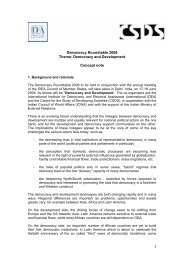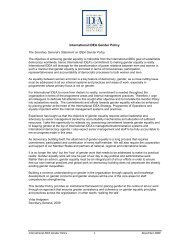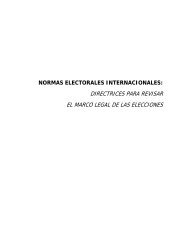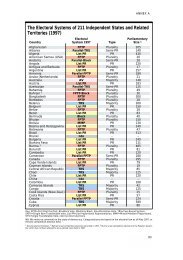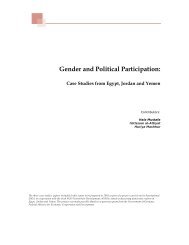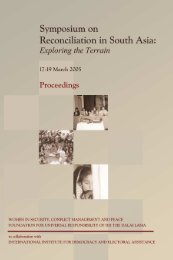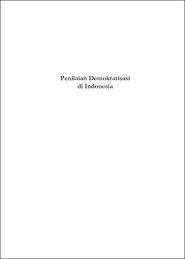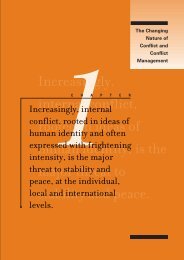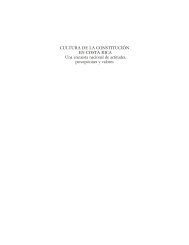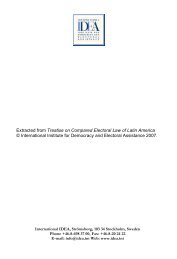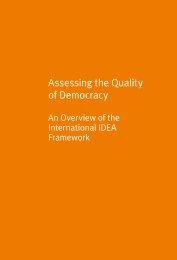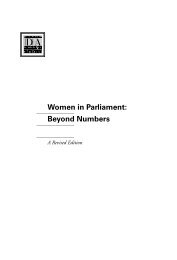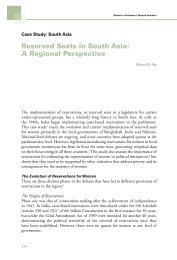The Role of State Constitutions in Protecting ... - International IDEA
The Role of State Constitutions in Protecting ... - International IDEA
The Role of State Constitutions in Protecting ... - International IDEA
You also want an ePaper? Increase the reach of your titles
YUMPU automatically turns print PDFs into web optimized ePapers that Google loves.
epresentation was accepted, however, the larger <strong>State</strong>s tended to favor a weaker,<br />
rather than a stronger Senate. In the end, this difficult issue ended <strong>in</strong> compromise.<br />
<strong>The</strong> orig<strong>in</strong>al <strong>State</strong>s would be equally represented <strong>in</strong> the Senate. <strong>The</strong> Senate would<br />
have almost co-equal power with the House <strong>of</strong> Representatives. It would not,<br />
however, be able to <strong>in</strong>itiate tax or appropriation bills, nor amend bills impos<strong>in</strong>g<br />
taxation or the key appropriation bills. <strong>The</strong> voters <strong>of</strong> each <strong>State</strong>, act<strong>in</strong>g as a s<strong>in</strong>gle<br />
electorate, would also directly elect the Senators for the <strong>State</strong>.<br />
A second, very difficult issue was the fiscal settlement. It was accepted that both<br />
levels <strong>of</strong> government would have their own tax<strong>in</strong>g powers. It was also accepted,<br />
however, that the Commonwealth would have exclusive power to impose duties<br />
<strong>of</strong> customs. This was an important taxation source for the colonies. If it were<br />
transferred to the Commonwealth, it would be necessary for some revenue to be<br />
redistributed regularly by the Commonwealth to the <strong>State</strong>s. <strong>The</strong> disagreement<br />
was over the basis on which redistribution should occur. More customs revenue<br />
was collected <strong>in</strong> some colonies than <strong>in</strong> others. <strong>The</strong>se colonies took the view that<br />
the moneys should be redistributed <strong>in</strong> proportion to collections. Other colonies,<br />
understandably, preferred another basis for redistribution; population numbers<br />
was the obvious alternative. In the end, there was another compromise. Revenue<br />
would be distributed <strong>in</strong>itially on the basis <strong>of</strong> collections. After a short <strong>in</strong>itial<br />
period <strong>in</strong> which this was guaranteed, however, distribution would be made on<br />
whatever basis the Commonwealth Parliament deemed “fair”.<br />
<strong>The</strong>re was some conflict between the <strong>in</strong>terests <strong>of</strong> the various colonies over the<br />
procedure for constitutional change as well. A referendum was the obvious<br />
procedure, given the means by which the Constitution would be approved <strong>in</strong> the<br />
first place. But should the people vote nationally, which would give the larger<br />
<strong>State</strong>s greater <strong>in</strong>fluence, or with<strong>in</strong> <strong>State</strong>s, giv<strong>in</strong>g the smaller <strong>State</strong>s more <strong>of</strong> a say?<br />
<strong>The</strong> result was to require both: a national majority and a majority <strong>in</strong> a majority<br />
<strong>of</strong> <strong>State</strong>s to approve a referendum. In addition, certa<strong>in</strong> parts <strong>of</strong> the Constitution<br />
<strong>of</strong> particular importance to the <strong>State</strong>s, such as their proportionate representation<br />
<strong>in</strong> the Parliament, and the protection for <strong>State</strong> boundaries, could be altered only<br />
with the approval <strong>of</strong> voters <strong>in</strong> the <strong>State</strong>s that were concerned.<br />
For the most part, the British Parliament simply enacted the Constitution<br />
approved <strong>in</strong> Australia. <strong>The</strong>re was, however, conflict between the British<br />
government and the colonists over appeals to the Privy Council, which had been<br />
greatly restricted by the Australian draft. Without compromise, enactment <strong>of</strong> the<br />
Constitution was threatened, at least <strong>in</strong> the form that the Australians had agreed.<br />
<strong>The</strong> restrictions on appeals were relaxed, a little, while still preserv<strong>in</strong>g exclusively<br />
for Australian courts the sensitive constitutional issue <strong>of</strong> the boundary <strong>of</strong> power<br />
between the Commonwealth and the <strong>State</strong>s.<br />
<strong>The</strong>se are old battles. Upper Houses and fiscal federalism are issues <strong>in</strong> federations<br />
everywhere, but the detail <strong>of</strong> these struggles <strong>in</strong> Australia is not relevant for Burma.<br />
<strong>The</strong>y are noted here as examples <strong>of</strong> conflicts between <strong>State</strong> <strong>in</strong>terests, <strong>in</strong> form<strong>in</strong>g a<br />
32



